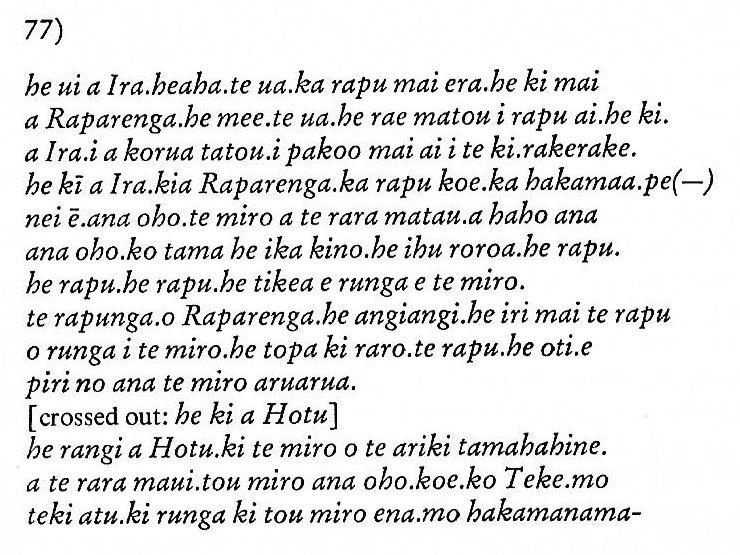

|
E:73 → 584 / 8 = 365 / 5 → 40
(February 9) + 33 (→ Mira)
... On February 9 the Chorti Ah K'in,
'diviners', begin the agricultural year. Both the 260-day cycle and
the solar year are used in setting dates for religious and
agricultural ceremonies, especially when those rituals fall at the
same time in both calendars. The ceremony begins when the diviners
go to a sacred spring where they choose five stones with the proper
shape and color. These stones will mark the five positions of the
sacred cosmogram created by the ritual. When the stones are brought
back to the ceremonial house, two diviners start the ritual by
placing the stones on a table in a careful pattern that reproduces
the schematic of the universe. At the same time, helpers under the
table replace last year's diagram with the new one. They believe
that by placing the cosmic diagram under the base of God at the
center of the world they demonstrate that God dominates the
universe. The priests place the stones in a very particular order.
First the stone that corresponds to the sun in the eastern, sunrise
position of summer solstice is set down; then the stone
corresponding to the western, sunset position of the same solstice.
This is followed by stones representing the western, sunset position
of the winter solstice, then its eastern, sunrise position. Together
these four stones form a square. They sit at the four corners of the
square just as we saw in the Creation story from the Classic period
and in the Popol Vuh. Finally, the center stone is placed to form
the ancient five-point sign modern researchers called the quincunx
... |
| ananake ko toona titiro.ki runga ki
te miro he ha(-) |
Oti and his assistants took
all of them on board the canoe and left them there, the thirty-three
[→ Mira] big calabashes with the birds. |
| karere.atotoru
te kauatu.te kaha manu.he ho(-) |
| te moai.e iri
era te tangata ki runga ki te |
The people went on board
the canoe, and bananas, yams, taro, sweet potatoes, chicken, and
also [tokoa] pigs (?) and all kinds of [anakeanake]
shoots (huri) were added. |
| miro.ko te maika. ko te uhi.ko te
taro.ko te kumara. |
| ko te moa.ko te kekepu. tokoa.ko te
huri tokoa. |
| anakeanake te huri. |
| Iri, 1. To go up;
to go in a boat on the sea (the surface of which gives the
impression of going up from the coast): he-eke te tagata ki ruga
ki te vaka, he-iri ki te Hakakaiga, the men boarded the boat and
went up to Hakakainga. 2. Ka-iri ki puku toiri ka toiri.
Obscure expression of an ancient curse. Vanaga. Iri-are, a
seaweed. Vanaga. |
| he ki a Matua.kia Hotu. ka too
(Crossed out: toa te hanau eepe) |
Matua said to Hotu, 'Take
along [ka too toa te hanau eepe] [also,
tokoa] the Hanau Eepe and let them work [mo keukeu]
the land!' |
| tokoa te hanau eepe.mo keukeu o tou
kainga.he ra(-) |
| ngi.a Hotu kia Teke.ka oho.ka too te
tangata. |
Hotu called out [he rangi] to
Teke: 'Go along and bring |
|
E:74 → (392 + 348) / 10 → 80 - 6 (ono) |
| kopu.
aririma te rau.ki runga ki te maro. |
the 500 prisoners on board
the canoe!'
He took all of them [tahi he mau] along, led them on board
the canoe, and left them there [he hakarere].
For six days (po ono), mats (moenga) were taken on
board the canoe (i.e., the loading of the canoe took six days). |
| he too tahi he mau ki runga.ki te
maro.he ha(-) |
|
karere.etahi poō no.
o te moenga. i too ai |
| ki
runga ki te miro. |
| Kopu. Heart,
breast, paunch, belly, entrails; kopu mau, stomach;
kopu takapau nui, big belly; mamae kopu, bellyache. T
Pau., Mgv.: kopu, belly, paunch. Mq.: kopu, opu,
belly, stomach, breast. Ta.: opu, belly, intestines, spirit,
intelligence. Churchill. Ta.: opu, to rise, of the sun. Ma.:
kopu, the morning star. Churchill.
Turirima, elbow. ... Fakataka
swims and swims, reaching another land. She goes there and stays on
the upraised reef in the freshwater pools on the reef, and there
delivers her child, a boy child. She gives him the name
Taetagaloa. When the baby is born a golden plover flies over and
alights upon the reef. (Kua fanau lā te pepe kae lele mai
te tuli oi tū mai i te papa). And so the
woman thus names various parts of the child beginning with the name
'the plover' (tuli): neck (tuliulu), elbow (tulilima),
knee (tulivae) ...
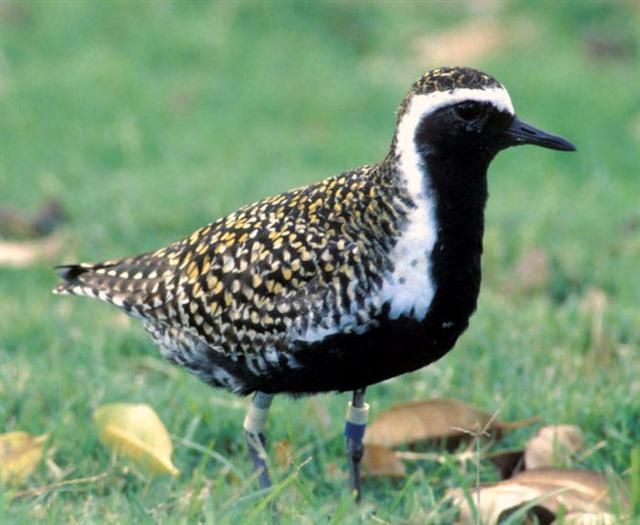
Ai. Aai 1. Who: interrogative pronoun used in place of
koai te mee ...: Aai i-tu'u-mai-nei, e-haúru-ró-ana au? =
Koai te mee i-tu'u-mai-nei, e-haúru-ró-ana au? Who is it who
came here when I was sleeping? 2. Whose: genitive pronoun. Vanaga.
1. (Ko ai) Who, which. 2. Then. 3. Consequence. 4. (Hai).
Churchill. |
| he
oho.mai te miro. o Hotu.mai maori.ki |
Hotu's canoe [te miro. o
Hotu] sailed [he oho] from Maori to Te Pito O Te Kainga. |
| te pito
o te kainga. |
|
i te porua o te raa. o hora nui.i oho
mai. |
It sailed on the second day
of September (hora nui). |
| ai. |
| o
ava.rei Bua (sic!).mai te rua painga. |
The canoe of the king (ariki is
used here incorrectly for tapairu 'queen'), of Ava Rei Pua, |
| Although the Easter
Islanders still cautiously kept all their small stone and wood
carvings in hiding, they did reveal their own artistic talent and
activity by carrying forth colossal paina figures in the
presence of the Spaniards [1770]. These were skilfully made
light-weight dolls of superhuman size, fashioned from painted
bark-cloth stuffed with branches, grass, and reeds. They were
carried in processions and erected at the side of old image
platforms, as if they represented some substitute for the giant
stone men of the Middle Period that this historic or Late Period
population was unable to carve or erect. Agüera (Ibid., p.
95) gave the following account of the paina figures, after a
description of the ancient stone statues of which an unspecified
number were still standing on ahu: 'They have another effigy
or idol clothed and portable which is about four yards in length: it
is properly speaking the figure of a Judas, stuffed with straw or
dried grass. It has arms and legs, and the head has coarsely figured
eyes, nostrils, and mouth: it is adorned with a black fringe of hair
made of rushes, which hangs half-way down the back. On certain days
they carry this idol to the place where they gather together, and
judging by the demonstrations some of them made, we understood it to
be the one dedicated to enjoyment ...(Heyerdahl 3) Der Cultus
bestand in Anrufung der Götter, deren Willen der Priester erklärte,
in Opfern an Lebensmitteln, auch an Menschen, und in der Feier
gewisser, zu bestimmten Zeiten wiederkehrender Feste (rakauti),
von denen das erste im Früjahr 2 Monate dauerte, das zweite im
Sommer mit der Errichtung einer Pyramide aus Zweigen (paina)
endete, das dritte in den Winter fiel; bei allen fanden Tänze,
Gesänge, Spiele aller Art statt. (Churchill: From 'Die Inseln des
stillen Oceans' by Carl E. Meinicke; zweiter Theil, 1876, p. 228.)
Paina. Human likeness, large doll (made in ancient
times). Vanaga. T. To make a noise. H. To sound, as in breaking or
tearing anything. Churchill.
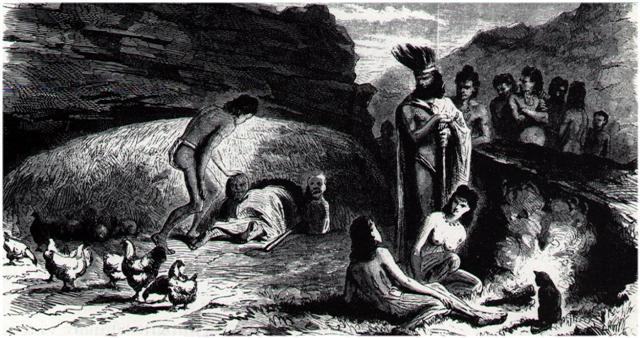 |
| ku
oho.takoa mai ana te miro o te ariki |
also sailed on the other side [ku
oho tako'a]. |
| i
vaenga.i piri ai te miro. o ava rei pua. |
They had attached [i
piri ai] the canoe of Ava Rei Pua to the middle [i vaenga]
of the canoe of Hotu (i.e., a double canoe had been built for the
long voyage across the sea.)
The canoe of Ava Rei Pua and of Hotu were seen near the
(offshore) islets. |
| ki te
miro. o Hotu. |
| a te
motu.i onga mai ai te miro. o Hotu.o
Ava rei |
|
pua. |
| Aro. Face, front,
side (of a figure); ki te aro o ..., to the front of ...
Vanaga. Presence, body, frontispiece; ki te aro, face to
face. P Pau.: aroga, the visage; ki te aroga,
opposite. Mgv.: aro, presence, before; i te aro, in
the presence of. Mq.: aó, face, in the presence of, before.
Ta.: aro, face, front, presence, view. It is probable that
more than one word is confounded in alo. The significations
which appear in Southeast Polynesia are most likely derived from a
Tongafiti alo and do not appear in Nuclear Polynesia. The
alo belly and alo chief which do occur in Nuclear
Polynesia are also probably Tongafiti, for in Samoa and Tonga they
are honorific and applied only to folk of rank, a good indication of
borrowing by the Proto-Samoans from Tongafiti masters. Churchill. In
the Hawaiian group, the western portion or side of an island was
called 'the front', ke alo, of the land, and the eastern side
was called 'the back', ke kua. The reason of such
designations must be sought in the fact of the arrival of the
inhabitants from the west. Fornander. |
|
i te tahi
te angahuru marima o te raa.o ta(-) |
On the fifteenth day of the
month of October (tangaroa uri) the canoe of Hotu |
|
ngaroa uri i tomo ai.te miro o
Hotu.raua |
| Tahi. Other; te
tahi tagata someone else; te tahi hoki... and others
again...; te tahi... te tahi..., some... others; te tahi
atu, the rest of them. Tahitahi, to scrape with a
sharpened stone. Vanaga. One, only, simple; te tahi, next;
e tahi, anyone; e tahi no, unique, unity; e tahi e
tahi, simultaneous. P Mgv.: Mq., Ta.: tahi, one.
Churchill. |
|
January |
31 |
31 |
|
February |
28 |
59 |
|
March |
1 |
60 |
|
31 |
90 |
|
April |
14 |
288 - 184 |
|
30 |
120 |
|
May |
31 |
151 |
|
June |
30 |
181 |
|
July |
31 |
212 |
|
August |
31 |
243 |
|
September |
1 |
60 + 184 |
|
29 |
273 |
|
October |
15 |
288 = 244 +
44 |
|
31 |
304 |
|
November |
30 |
334 |
|
December |
31 |
365 |
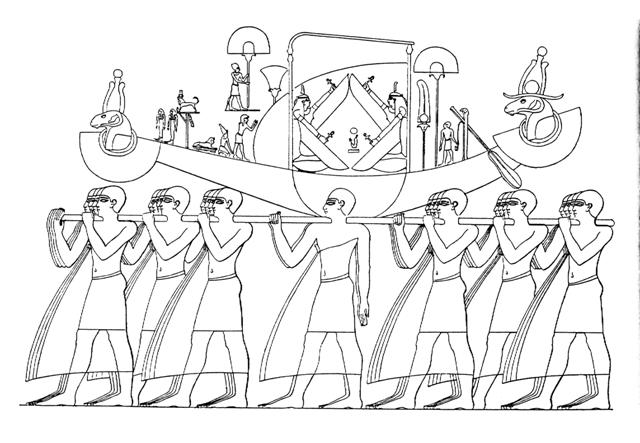 |
|
E:75 → 600 / 8 |
| ko te
miro a Ava rei pua. |
and the canoe of Ava Rei Pua landed. |
|
i te angahuru marima o
te raa.o tangaroa uri.i te po. |
On the fifteenth day of the
month of October (tangaroa uri), Nonoma left the house [he
ea mai roto i te hare] during the night [i te po] to
urinate outdoors [ki kaho.mimi].
At this point Ira called out [he rangi] to Nonoma, 'Look
at the canoe!'
Nonoma ran [he tahuti], he quickly went to Te Hiringa Heru
(a ravine in the side of the crater Rano Kau) and looked around.
There he saw the double canoe way out near the (offshore) islets [i
te motu o haho], and the two (hulls of the canoe) were lashed
together. |
| ana.he
ea a Nonoma.mai roto i te hare.ki kaho. |
| mimi.he
rangi mai a Ira.kia Nonoma.e ui tau mi(-) |
| ro.he
tahuti he oho.a Nonoma.he onga i te hikinga |
| heru.i
ka ui atu nei ko te miro.i te motu o haho.e |
|
hakapiri ro a.ārurua. |
| Evidently a pair of wovels
close together was here written as e.g.
poō no = po-ono (6 nights) and
ārurua = a aru-rua (a
pair held firmly).
Aru. Áruáru, reduplication of aaru: to grab firmly.
Vanaga. 1. To pursue. P Mgv.: aruaru, to run after, to chase,
to follow. Ta.: aruaru, to pursue. 2. To raise in waves,
undulation. P Pau.: puhigaru, a bubble of water. Mgv.:
garu, foam, froth. Mq.: naú, waves. Ta.: aru,
billow, wave, flood. 3. (haruharu). Churchill. |
| Nonoma was out
fertilizing Mother Earth in night number 288
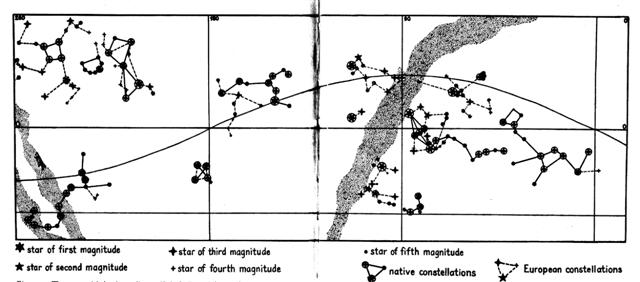
and to convert this to daytime we ought to reduce with 183 (= 366
/ 2), which leads us to day 105 (April 15). And by adopting the
positions of the stars in the year 1582 AD we will find
ºApril 15 at Alrisha (the Knot, α
Piscium).
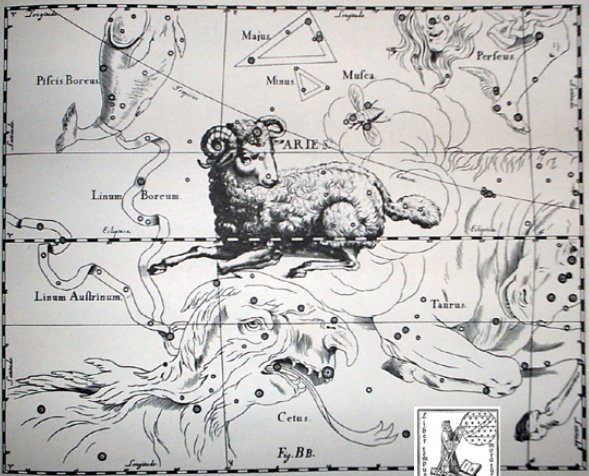
|
JULY 2 |
3 (*104) |
4 (740 / 4) |
 |
 |
 |
|
Ga4-20 |
Ga4-21 (8 *
13) |
Ga4-22 |
|
CLOSE TO THE
SUN: |
|
11h (167.4)
χ
Leonis, χ¹ Hydrae (167.1), χ² Hydrae (167.3)
*167.4
- *41.4 = *126.0 |
AL SHARAS (The Ribs)
= β Crateris
(168.6) |
Al
Zubrah-9 (Mane) /
Purva
Phalguni-11 (First Reddish One -
Fig Tree)
ZOSMA
(Girdle, not Belt) = δ Leonis
(169.2), COXA
(Hips) = θ Leonis
(169.4)
*169.4
- *41.4 = *128.0 |
|
... God created Eve from one of
Adam's ribs ('reefs') and therefore I at first tried to translate
the female (β) star name Al
Sharas with The Rib. Although according to Allen
this star was plural: '... β
... was one of Al Tizini's Al Sharāsīf,
the Ribs, - i.e. of the Hydra, - and the first of the
set.' Adam had, as I remember it, another wife before
Eve, viz. Lilith ...
 |
|
Sept 4 |
5 (248 = 104
+ 144) |
6 (185 + 64
= 249) |
|
°Aug 31 |
°Sept 1 |
2 (245) |
|
'Aug 8 (*140
= *167 - *27) |
9 |
10 (222 =
185 - 27) |
|
"July 25 (*126) |
26 |
27 (144 =
185 - 41) |
|
DAY 167 |
168 (= 24
* 7) |
169 |
|
| he
tahuti he hoki mai ki mua ki te hare.he tuu he rangi.a |
He ran and returned [he
tahuti he hoki] to the front of the house [ki te mua
ki te hare]. He arrived and called [he tuu he rangi] into
the house [a roto i te hare], 'Hey you! This canoe has
arrived during the night without our noticing it!'
Ira asked [he ui] Nonoma, 'Where is the canoe, which you
say is lying out there (in the water)?'
Nonoma's voice [te reo] came back [he hakahoki]:
'It is out there (in the water) close to the (offshore) islets!
There it lies [e noho mai nei], and the two (hulls) are
lashed together.' |
| roto i
te hare.he ro korua ē.ku mou mai era ā tau miro |
| nei.i
anga po.ana.he ui mai a Ira.kia Nonoma.ihē tau |
| miro.e
noho mai ena.he hakahoki mai te reo o Nonoma.e |
| i te
motu o haho.e noho mai nei.e hakapiri
ro ana.eruā |
| miro. |
| he ea.ā(corrected
to haho from
oono)
.he too i te raupā rapu. |
The four of them (corrected
for 'the six of them') went out and picked up [he too] leaves
(on branches) to give signals.
They picked them up, went and arrived at Te Hikinga and saw the
canoe.
Ira remained at the house [i roto ana i te hare a Ira]
after the four (corrected for 'the six') had gone [i oho era]
to Te Hikinga Vae (sic). |
| he mau
he oho.hetu(-) |
| u.ki te
hikinga.he ui i te miro.i roto ana i te hare a Ira. |
| i oho
era.ā (corrected to haho
from oono)
ki te hikinga vae. |
| Haho. Outside.
Vanaga.Ha. 1. Four. 2. To breathe. Hakaha'a, to
flay, to skin. Vanaga. 1. Four. P Mgv., Mq., Ta.: ha,
id. 2. To yawn, to gape. 3. To heat. 4. Hakaha, to skin, to
flay; unahi hakaha, to scale fish. Mgv.: akaha, to
take to pieces, to take off the bark or skin, to strip the leaves
off sugarcane. 5. Mgv: ha, sacred, prohibited. Mq.: a,
a sacred spot. Sa.: sa, id. Churchill. Ho. 1. Ho!,
Oh! 2. Lest, on the point of. 3. To deliver, to give up. Churchill.
Hiki. To flex the knees lightly, as used to do the youths
of both sexes when, after having stayed inside for a long period to
get a fair complexion, they showed themselves off in dances called
te hikiga haúga, parading on a footpath of smooth stones,
with their faces painted, lightly flexing their knees with each
step. Vanaga. Tail fin G (? hiku). Churchill. Hiki kioe
(Cyperus vegetus), a plant whose roots were eaten during times
of famine and the stems of which were used for medicinal purposes.
Barthel 2. Pau.: Hiki. 1. To fondle. Mgv.: hiki, to
dandle. Ta.: hii, id. Mq.: hiki, id. 2. To flee. Mq.:
hiki, flight. Pau.: Fakahihiu, to scare away, Ma.:
whiu, to drive. Churchill. Mgv.: Hiki, to commence or to
finish mat weaving. Mq.: hiki, to finish mat weaving.
Churchill. ... The brothers of Maui sat trembling
in the middle of the canoe, fearing for their lives. For now the
water was frothing and heaving, and great hot bubbles were coming
up, and steam, and Maui was chanting the incantation called Hiki,
which makes heavy weights light ...
Heu. Offspring of parents
from two different tribes, person of mixed descent, e.g.
father Miru, mother Tupahotu. Heuheu, body
hair (except genitals and armpits). Vanaga. 1. Heheu; ivi
heheu, the cachalot, bone needle; hakaheu, spade, to
shovel, to grub up, to scratch the ground, to labor; rava
hakaheu, laborious, toilsome. 2. Hakaheu, affair.
Churchill. M. Heu, to separate, to pull asunder; the eaves of
a house; heu, a single hair; hau. to hew; heru,
to comb; huru, hair on the body; down; feathers; maheu,
scattered; maheuheu, shrubs; mahuru, scrub; heuea,
to be separated. Text Centre. Nonoma ran,
he quickly went to Te Hikinga Heru (a ravine in the side of
the crater Rano Kau) and looked around. There he saw the
double canoe way out near the (offshore) islets, and the two (hulls
of the canoe) were lashed together.
Vae. Va'e: Foot, leg;
te va'e mata'u, te va'e maúi, right foot, left foot. Va'e
ruga, va'e raro, quick and light, without detour (lit.: foot up,
foot down). Ka-oho koe ki a nua era va'e ruga va'e raro, ina ekó
hipa-hipa, hurry straight to your mother, do not make any
detours. Va'e pau, misshapen foot, clubfoot. Vae, to
choose. Vaega, middle, centre; i vaega o, in the
middle of. Vanaga. 1. Foot, paw, leg, limb; vae no roto,
drawers; karikari vae, ankle. P Pau.: vaevae, foot,
leg. Mgv.: vaevae, id. Mq.: vae, id. Ta.: vaevae,
avae, id. 2. Pupil. 3. To choose, elect, prefer, promote,
vote; vavae, to destine, to choose; vaea (vae
2), pupil. Vaeahatu (vae 1 - ahatu): moe
vaeahatu, to sleep sprawling with legs extended. Vaega,
center, middle, within, half; o vaega, younger; ki vaega,
among, between, intermediate. P Pau.: vaega, the middle.
Mgv.: vaega, center, middle. Mq.: vaena, vavena,
vaveha, id. Ta.: vaehaa, half. Vaehakaroa (vae
1 - roa): moe vaehakaroa, to sleep with legs stretched
out. Vaehau (vae 1 - hau 3), pantaloons,
trousers. Vaeherehere (vae 1 - here 1), to
attach by the paw. Vaerere (vae 1 - rere 1), to
run. Churchill. Ta.: 1. Timbers of a boat. Ha.: wae, knees,
side timbers of a boat. 2. To share out. Sa.: vae, to divide,
to share. Ma.: wawae, to divide. Churchill. |
|
8
weeks |
CHRISTMAS EVE |
181 |
ST
JOHN'S DAY |
5 |
SIRIUS |
43 |
AUG
12 (224) |
|
SITULA |
Aug
27 |
Sept
2 (245) |
Oct
15 (288) |
|
230
= 2 * 115 (→ Mercury) |
|
232
= 8 * 29 (→ Mercury) |
*342 (Situla) - *165 (Alkes) = *177 =
*354 / 2. Therefore another 6 days had to be given to
the Sun King (because 366 / 2 = 183). The journey of the
Explorers (planets) was in the night and their 38 nights
had to be extended with 6 days in order to give the
double-canoe of the Sun the necessary time-space.
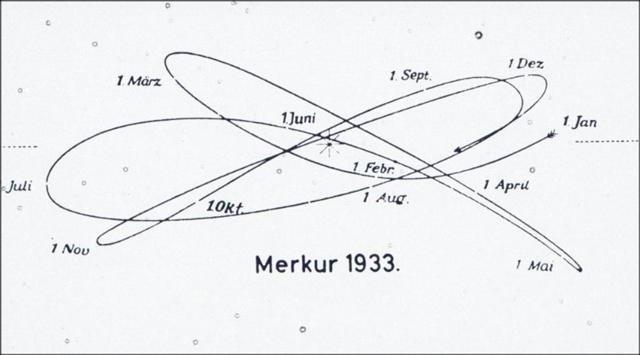
... Ganz ähnlich is der Name 'Gott von Duazag'
des Gottes Nabū ... zu erklären.
Er bezeichnet ihn als den Gott des Wachtstums, welches
als aus dem Osten stammend betrachtet wird, weil die
Sonne, die das Wachstum bringt, im Osten aufgeht.
Dass aber Nabū als Ost-Gott aufgefasst wurde,
hängt damit zusammen, dass sein Stern, der Mercur, nur
im Osten oder Westen sichtbar ist ...
|
|
E:76 |
| he
noho.he hakatopa.i te kī.āhaha. he kī ahaha |
The four sat down [he
noho] and pondered [he
hakatopa] over the report [i
te kī] (of the result of the explanation). Then the four
said [he kī ahaha],
'One has to get up [ka ea.etahi]
and let the king know the news (about the conditions on Easter
Island)!'
Raparenga [the Moon] got up, picked up the leaves, took them in
his hands, and waved, waved, waved, [waved,] and waved. |
| ka
ea.etahi ka rapu.ka hakamaa.ki te ariki. i te |
| kī.he
ea.a Raparenga.he too mai i te raupa.he |
| mai ki
te rima.he rapu he rapu he rapu he rapu |
|
he rapu.he tikea e te tangata.hakamaa
ki te rapu. |
|
... Nut, whom the Greeks
sometimes identified with Rhea, was goddess of the sky, but it was
debatable if in historical times she was the object of a genuine
cult. She was Geb's twin sister and, it was said, married him
secretly and against the will of Ra. Angered, Ra had the couple
brutally separated by Shu and afterwards decreed that Nut could not
bear a child in any given month of any year. Thoth, Plutarch tells
us, happily had pity on her. Playing draughts with the Moon, he won
in the course of several games a seventy-second part of the Moon's
light with which he composed five new days. As these five
intercalated days did not belong to the official Egyptian calendar
of three hundred and sixty days, Nut was thus able to give birth
successively to five children: Osiris, Haroeris (Horus), Set, Isis
and Nepthys
...
The repeated wavings (waves) presumably were
referring to the 'reef' where the Sea was breaking (ranu)
- where Land (like Venus) was being born.
|
| he onga
a raro.he rangi ki te ariki.penei e rapu mai |
This was seen by the man
who understood signals; he looked down and called out the following
to the king: 'They are waving, they are signaling the following
message: The land is bad; the shoots growing out of the ground
cannot spread because the algae-like thicket is vry long when it is
pulled out, when it is ripped out (this means that the runners of
the yam roots that were planted are unable to prevail against the
heavy weeds, which hve to be pulled out continually).' |
| era.e
hakamaa mai era.i te kī hoōu. penei ē. |
| kainga
kino.kahukahu o
hēke.rimurimu roroa. |
| mai te
unu mai te unu. |
| Kino. 1. Bad;
kikino, very bad, cursed; kona kino, dangerous place. 2.
blemish (on body). Kinoga, badness, evil, wickedness; penis.
Kinokino, badly made, crude: ahu kinokino, badly made
ahu, with coarse, ill-fitting stones. Vanaga. 1. Bad, wrong. T Pau.:
kiro, bad, miserable. Mgv.: kino, to sin, to do evil.
Mq.: ino, bad, abominable, indecent. Ta.: ino, iino,
bad, evil; kinoga (kino 1) sin; Mgv.: kinoga,
sin, vice. 2. A skin eruption, verruga, blotched skin, cracked feet
T. Churchill.
Heke. (Heke), hakaheke, to pull down, to
overthrow. Mgv.: akaeke, to overthrow, to vanquish; heke,
to fall down, to fall to pieces: akaheke; akahekeheke,
to demolish. Mq.: heke, to crumble, to fall down; hakaheke,
to demolish, to pull down. Churchill. Kai heke, hakaheke,
to deflower.
Kahukahu o heke, an octopus hiding in his ink.
Mq.: ve'eve'e 'tentacules du heke'.
Barthel 2. Pau.: Heke, to purge. Mgv.: heke-toto,
hemorrhage. Ta.: hee, to purge. Mq.: heke, to drip.
Ma.: heke, id. Pau.: Hekeheke, elephantiasis. Ta.:
feefee, id. Mq.: fefe, id. Sa.: fe'efe'e, id.
Mgv.: Heke, eke, octopus. Ta.: fee, id. Mq.:
heke, feke, fee, id. Sa.: fe'e, id. Ma.:
wheke, id. Ta.: Hee, to slide, to swim. Sa.: se'e,
to slide, to shoot the breakers. Ha.: hee, id. Mq.: Hee
oto, to cut. Sa.: sele, id. Ha.: helehele, id.
Churchill. Ma.: 1. Migrate. Islands of History. 2. Rafter.
Starzecka.
Unu. 1. To drink;
unuga, the act of drinking. 2. To pull weeds, grasses. 3. To
pluck; ka-unu te huruhuru o te moa! pluck the chicken's
feathers! Únu-únu, to bask in the sun (ki te raá), to
warm oneself by the fire (ki te ahi ). Vanaga. To drink,
liquor. Unuga, to drink. Hakaunu, to slake thirst.
Hakaunuora, to water. P Mgv.: unu, to drink. Mq., Ta.:
inu, id. Unuvai, to drink water; hipu unuvai,
drinking glass. Churchill. |
| he
rangi mai te ariki.a Hotu.kia Tuki.ka rapu |
King Hotu called [he
rangi] to Tuki, 'Signal and answer [ka rapu koe.ka
hakahoki] the following: The homeland is bad too, (because
there) the flood [tau ua] brings destruction and the low tide
[tai papaku] brings relief (this is a reference to the losses
cused in Hiva by the rising of the water, or rather, by the
subsidence of the land).' |
| koe.ka
hakahoki.penei ē. kainga kino hoki.tau ua |
| ka
okooko.tai papaku ka ora. |
| ... There exists a
surprisingly developed terminology for distinguishing the phases of
the tides: tai pâpaku, low tide; ku-gúgú-á te tai,
tide at his lowest, literally 'the sea has dried up'; he-ranu te
tai, when the water starts rising again; this is a strange
expression, since ranu means 'amniotic liquid,' the breaking
of the waters which precedes birth; in this phase of the tides the
fish start coming out of their hiding places and swim to the coast
in search of food; tai hahati, rising tide; tai hini
hahati, tide as it continues rising; tai u'a, tai u'a parera,
when the tide has reached its high; tai hini u'a, tide
all throughout its full phase; tai hori, tide as it starts
receding; tai ma'u, tide during its decreasing phase, right
until it becomes tai pâpaku again; tai raurau a riki,
the slight swell, or effervescence of the sea at a change of the
moon ... |
| ku tuu
ana a Ira.raua ko (Ng)a tavake. |
(In the meantime) Ira and Nga Tavake
had arrived. |
| he
rapu.mai a Tuki.he hakahoki mai i te kī.penei. |
Tuki signaled and answered
the message in this manner - he waved and waved.
The signal arrived up (at the cliffs) where Raparenga was. He
looked out and watched for it. Then the waving stopped (?). |
| ē.he
rapu he rapu.he iri atu te rapu.a Rapa(-) |
|
renga.he ui mai ku tikea ana.he topa.he
rapu. |
|
Topa. 1. To bend down, to
drop to the ground; to fall on a certain date. 2. To stop doing
something, to drop; ina ekó topa taau aga, do not stop, keep
doing your work. 3. To remain, to be left over, to be unfinished;
he topa te kai, the food is not finished, there is some left. 4.
To come to one's memory; i te aamu he topa te vânaga tûai, in
the legends old words come to memory. 5. To remember, to reflect
(with mana'u as subject); e-topa rivariva tokorua mana'u
ki te me'e nei, let the two of you think carefully about this
thing. Vanaga. 1. Wine; topa tahaga, id. 2. To fall in drops,
to descend, to go down, to abdicate; topa iho, to fall;
hakatopa, to knock down, to cause to fall; hakatopa ki raro,
to knock down, to subjugate. 3. Childbirth, abortion; topa te
poki, to lie in. 4. A feast, to feast. 5. To arrive, to result;
topa rae, newcome; topa iho, to come unexpectedly;
topa ke, to deviate; topa no mai, topa hakanaa,
topa tahaga, mau topa pu, unexpected; topa okotahi,
solitary; hakatotopa, to excite, to foment. 6. Bad, low,
cheap, failure; igoa topa, nickname; ariga topa,
sinister, sly, ill-tempered, to hang the head; hakatopa, to
disparage; hakatotopa, irresolute. 7. (Of upward movement)
topa ki raro, to scale, to surpass; hakatopa ki te ao, to
confer a dignity; hakatopa ki te kahu, to spread a sail;
hakatotopa, to make a genealogy. Churchill. |
|
E:77 |
| he ui a
Ira.heaha.te ua.ka rapu mai era.he ki
mai |
Ira asked [he ui a Ira], 'Why [heaha]
did they send signals?' |
| Aha. What? Which?
To do, to be what? He aha koe? what are you? E-aha-á koe?
what are you doing? Ku-aha-á koe? what have you done?
Kahu aha? what, which garment? E-aha-mai-á ki a koe? what
does that do you, what harm does it do you, what is it to you?
Aha is preceded by the article te when introduced by a
preposition: te: o te aha, why, what for; mo te aha, ki te
aha, what for, with what purpose? Vanaga. Gaaha, to
burst, to become ruptured, to have a discharge of pus, of blood.
Ku gaaha te toto o te ihu. He had a nose-bleed. E û'i koe o
gaaha te îpu. Be careful not to break the bottle (lit. look out
lest the bottle burst). E tiaki á au mo gaaha mai o te harakea.
I shall wait for the abcess to burst. Gaatu, totora reed.
Vanaga. To break, to split, to crack, to rive; fracture, fissure,
break, crack, crevice (gaaha); niho gaa, toothache,
broken teeth; gaamiro (miro, ship) shipwreck; gaàpu
(pu 2), abortion; poki gaàpu, abortive child. T Mq.:
naha, nafa, split, fissure. Ta.: aha, afa,
crack fissure. Gaatu 1. Bulrush, reed. 2. (gatu).
Churchill. Ua. 1.
Cause, reason why something happens or is done; he ûa te ua, au
i-ta'e-iri-ai ki tooku hare, because of the rain, I did not go
home; ua kore, without cause, without reason. 2. Ceremononial
stave with a human face carved at one extremity. Vanaga. Cfr toko.
1. A long club T. 2. Mgv.: ua, the genitalia. Ta.: hua,
id. Mq.: hua, id. Ha.: hua, testicles. 3. Ta.: ua,
the back of the neck. Ma.: ua, id. Sa.: ua, the neck.
4. Ta.: ua, a land crab which shears iron. Ma.: uka,
lobster. Sa.: uga, the hermit crab. Churchill.
Ûa. Rain; 1. ûa hakamito,
persistent, but not strong, rain; 2. ûa kura, fine rain,
drizzle; 3. ûa matavaravara, strong rain; 4. ûa parera,
torrential rain; 5. ûa tai, rain followed by fair weather
at sea. Ehu ûa, drizzle. Vanaga.
Ûaûa. Tendons, muscles. 1. Hau ûaûa kio'e, line
made from rats' tendons. 2. Ûaûa toto, vein, artery. 3.
Ûaûa piki, spasm. Vanaga. 1. Rain; hoa mai te ua, to
rain; mou te ua, to cease raining. P Mgv., Mq., Ta.: ua,
rain. 2. Vein, artery, tendon (huahua
1) (uha G);
ua nene,
pulse; ua nohototo,
artery, ua gaei, pulse.
Uaua, vein, tendon, line;
kiko uaua, muscle T.
Hakauaua, to mark with
lines. P Pau.: tare-ua,
tendon. Mgv., Mq., Ta.: uaua,
vein, tendon. Churchill. U'a.
Of the tide, to reach its maximum; tai u'a, high tide.
Vanaga. Wave, surge; tai ua, high tide. Churchill.
Uá. Ata uá, morning twilight.
Uáuá, to reside;
resident; noho uáuá to settle somewhere; ina koe ekó noho
uáuá, do not establish yourself there. Vanaga. |
| a
Raparenga.he mee.te ua.he rae matou i rapu ai.he ki. |
Raparenga replied, 'Because [he
mee.te ua] we sent signals first [he rae matou].' |
| a Ira.i
a korua tatou.i pakoo mai ai i te ki.rakerake. |
Ira said [he ki.a Ira], 'We have
lost the bad new for you (which means, we have warned you in vain).' |
| he kī a
Ira.kia Raparenga.ka rapu koe.ka hakamaa.pe(-) |
Ira said [he kī a Ira]
to Raparenga, 'Give signals [ka rapu koe] and tell
this [ka hakamaa.penei]: If the canoe continues [ana
oho.te miro] to the right side [a te rara mata'u] (of
Easter Island, seen from Motu Nui), they should sail way out [a
haho ana ana oho] because of Tama, an evil fish with very long
nose [he ika kino.he ihu roroa] (this is a wordplay with the
place name on the southeastern shore, which 'demands bad victims
because of his cliffs').' |
| nei
ē.ana oho.te miro a te rara matau.a haho ana |
| ana
oho.ko tama he ika kino.he
ihu roroa.he rapu. |
| Kino. 1. Bad;
kikino, very bad, cursed; kona kino, dangerous place. 2.
blemish (on body). Kinoga, badness, evil, wickedness; penis.
Kinokino, badly made, crude: ahu kinokino, badly made
ahu, with coarse, ill-fitting stones. Vanaga. 1. Bad, wrong. T Pau.:
kiro, bad, miserable. Mgv.: kino, to sin, to do evil.
Mq.: ino, bad, abominable, indecent. Ta.: ino, iino,
bad, evil; kinoga (kino 1) sin; Mgv.: kinoga,
sin, vice. 2. A skin eruption, verruga, blotched skin, cracked feet
T. Churchill. Ihu. 1. Nose; ihu more, snub nose,
snub-nosed person. 2. Ihuihu cape, reef; ihuihu - many
reefs, dangerous for boats. 3. Ihu moko, to die out (a family
of which remains only one male without sons); koro hakamao te
mate o te mahigo, he-toe e-tahi tagata nó, ina aana hakaara, koîa te
me'e e-kî-nei: ku-moko-á te ihu o te mahigo, when the members of
family have died and there remains only one man who has no
offspring, we say: ku-moko-á te ihu o te mahigo. To disappear
(of a tradition, a custom), me'e ihu moko o te tagata o te kaiga
nei, he êi, the êi is a custom no longer in use among the
people of this island. 4. Eldest child; first-born; term used alone
or in conjunction with atariki. Vanaga. 1. Nose, snout, cape
T (iju G). Po ihuihu, prow of a canoe. P Pau.: ihu,
nose. Mgv.: ihu, nose; mataihu, cape, promontory. Mq.,
Ta.: ihu, nose, beak, bowsprit. Ihupagaha, ihupiro,
to rap on the nose, to snuffle. 2. Mgv.: One who dives deep. Ta.:
ihu, to dive. Churchill. Sa.: isu, nose, snout, bill.
Fu., Fakaafo, Aniwa, Manahiki: isu, the nose. Nuguria;
kaisu, id. Fotuna: eisu, id. Moiki: ishu, id. To.,
Niuē, Uvea, Ma., Ta., Ha., Mq., Mgv.,
Pau., Rapanui, Tongareva, Nukuoro: ihu,
id. Rarotonga: putaiu,
id. Vaté: tus, id. Viti:
uthu, nose. Rotumā:
isu, id. ...
usu and ngusu
... serve as transition forms, usu
pointing to isu
the nose in Polynesia and ngusu
to ngutu the mouth, which
is very near, nearer yet when we bear in mind that ngutu
the mouth is snout as well and that isu
the nose is snout too ... Churchill 2.
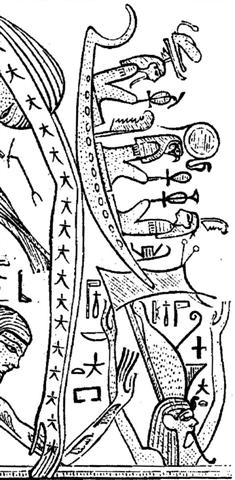
... string games could be resumed after it was
clear that the Sun had managed to leave the horizon and was rapidly
gaining in altitude: 'Before the sun starts to leave the horizon ...
when it shows only on the horizon, ... then string games were no
longer allowed as they might lacerate the sun. Once the sun had
started to go higher and could be seen in its entirety, string games
could be resumed, if one so wished. So the restriction on playing
string games was only applicable during the period between the sun's
return and its rising fully above the horizon
...
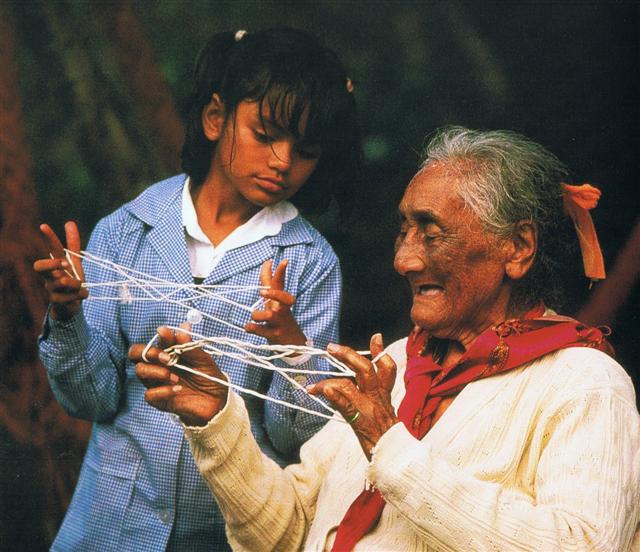 |
| he
rapu.he rapu.he tikea e runga e te miro. |
He waved, waved, waved [?],
and waved. The one on board the boat saw [he tikea e runga e te
miro] Raparenga's waving [te rapunga.o Raparenga]
and understood. The signals arrived [he angiangi] on board
the canoe [he iri mai te rapu o runga i te miro]; the waving
arrived below [he topa ki raro.te rapu] (i.e.. in the west).
[(Here they) died out, he oti.] |
| te
rapunga.o Raparenga.he angiangi.he iri mai te rapu |
| o runga
i te miro.he topa ki raro.te rapu.he oti. |
| (crossed out: he ki a Hotu) |
he ki a Hotu |
| |
The two hulls were no longer kept
lashed together (i.e., they were separated for the rest of the
journey). |
|
Oti. To come to an end; to
suffice, to be enough: ku-oti-á, it is finished; ina kai
oti mo kai, there is not enough to eat; he-oti á, there
isn't anymore left, it's the last one; it's enough with that.
Vanaga. Ta.: 1. Oti, presage of death. Sa.: oti, to
die. 2. To cut. Mq.: koti, oti, id. Sa.: 'oti,
id. Ma.: koti, id. Churchill. The nakshatra system works
with a pair - the Sun on one side and the Full Moon (Hotu) on
the other. In the night the Full Moon can be observed where the Sun
is not. When late after midnight the Full Moon has reached the
horizon in the west (ki raro) it implies the Sun is on its
way up in the east. |
| he
rangi a Hotu.ki te miro o te ariki tamahahine. |
Hotu called out [he
rangi] to the canoe of the queen [te aríki tamahahine]:
'Steer the canoe to the left side [a te rara maúi] when
you sail in. Teke will jump over on board (your) canoe to work his
mana [hakamanamana] when you sail [mo oho.atu]
through the fishing grounds [i te hakanononga]!'
[I will go (koau ma oho) to the right (a te rara mata'u),
working mana (mo hakamanamana) when going through the fishing
grounds (mo oho atu i te hakanononga).]
Teke jumped on board the second [he teki.a Teke.ki runga ki te
rua] canoe, (that) of the queen.
The king's canoe [te miro o te ariki. tamaaroa] sailed to
the right, the queen's [to te ariki. tamahanine] to the left. |
| a te
rara maui.tou miro ana oho.koe.ko Teke.mo |
| teki
atu.ki runga ki tou miro ena. mo |
| ka
hakamanama- |
| na mo
oho.atu i te hakanononga.koau ma oho. |
| a te
rara matau.mo hakamanamana mo oho. |
| atu i
te hakanononga.he teki.a Teke.ki runga ki te rua |
|
E:78 → Rigel & Capella (Mother Goat) |
| miro. o
te ariki. tamahahine. |
| he oho.
te miro o te ariki. tamaaroa.a te rara
matau |
| he oho,
to te ariki. tamahahine a te rara maui |
| Matua tamaroa,
father; matua tamaahine, mother. |
Counting from Rigel and Capella (*78) to Zosma and Coxa (*169)
we will find a quarter of a year. The separation of the pair of
hulls occured at different stars depending on where the
precession had moved the Sun.
|
JULY 4 (184) |
Zosma & Coxa |
|
June 7 (158) |
Rigel & Capella |
|
184 + 16 - 158 = 42
→ Bharani |
"March 21 (80) + 16 (days before the star reappears after
its close encounter with the Sun) = 96 ("April 6) → MARCH 14
(→ π):
|
FEBR 24 |
25 (56) |
26 (422) |
2-27 |
28 (*344) |
13 |
 |
 |
 |
 |
 |
|
Gb8-6 |
Gb8-7
(448) |
Gb8-8 |
Gb8-9 |
Gb8-10
(222) |
|
μ
Arietis (39.4),
HEAD OF THE FLY = 35 Arietis
(39.6),
KAFFALJIDHMA (Part of a Hand) =
γ
Ceti,
θ
Persei (39.8) |
π
Ceti,
ο
Arietis (40.0),
ANGETENAR (Bend in the River) =
τ¹
Eridani,
μ
Ceti (40.2),
RIGHT WING = 39 Arietis
(40.9) |
Bharani-2 (Yoni) /
Stomach-17 (Pheasant)
π
Arietis (41.2),
MIRAM (Next to the Pleiades) =
η
Persei
(41.3),
BHARANI
= 41 Arietis (41.4),
τ²
Eridani,
σ
Arietis (41.7) |
TA LING (Great Mound) = τ Persei
(42.4)
*1.0 = *42.4 - *41.4 |
ρ
Arietis (43.0),
GORGONEA SECUNDA =
π
Persei
(43.5),
ACAMAR
(End of the River) =
θ
Eridani
(43.6),
ε
Arietis (43.7),
λ
Ceti (43.9)
DENEBOLA (β Leonis) |
 |
|
April 29 |
30 |
May 1
(*41) |
2 (122) |
3 (*408) |
|
°April 25 |
26 (*36) |
27 |
28 (118) |
29
(*404) |
|
'April 2
(92) |
3 |
4 (*14) |
5 (460) |
6 |
|
"March 19 (78) |
20 (*364) |
0h |
22 (446) |
23 |
|
39
he rai atanga |
40
he ravi kana |
41
he ravi pako |
1 he hiva
matua |
2 he hiva poki |
|
3-14 (73) |
MARCH 15 |
16 |
17 |
18 |
19 |
20 (*364) |
 |
 |
 |
 |
 |
 |
 |
|
Gb8-24 (465) |
Gb8-25 |
Gb8-26 |
Gb8-27 |
Gb8-28 |
Gb8-29 |
Gb8-30 (242) |
|
MENKHIB (Next to the Pleiades =
ζ
Persei
(57.6)
PORRIMA (γ Virginis) |
ZAURAK (Boat)
=
γ
Eridani
(58.9) |
λ Tauri (59.3), ν Tauri (59.9) |
4h (60.9)
JĪSHUĬ = λ Persei
(60.7)
COR CAROLI (α Canum Ven.) |
υ Persei (61.2) |
BEID (Egg)
=
ο¹
Eridani
(62.2),
μ
Persei (62.8)
VINDEMIATRIX ( ε Virginis)
|
Al Dabarān-2 (The Follower)
HYADUM I =
γ
Tauri
(63.4)
*22.0 = *63.4 - *41.4 |
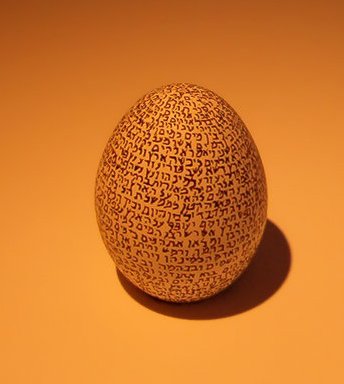 |
|
May 17 (137) |
18 (*41 + *17) |
19 (*424) |
20 |
21 |
22 |
23 (*428) |
|
°May 13 |
14 (*54) |
15 (*420) |
16 (136) |
17 |
18 (*58) |
19 (*424) |
|
'April 20 |
21 (111) |
22 |
23 |
24 |
25 (*400) |
26 (*36) |
|
"April 6 |
7 |
8 |
9 (464) |
10 (100) |
11 |
12 (*22) |
|
16 he aro piro
kumara aro piro |
17 he pekepeke mea |
18 he pekepeke uri |
19 he aringa rikiriki
kumara ariga rikiriki |
20 he tua tea |
20 he mamari kiakia |
1
he koro tea
korotea |
|
Peke.1.
To bite (of fish or lobster pecking at
fishhook). 2. To repeat an action:
he-peke te rua; ina ekó peke-hakaou te rua
don't you do it a second time; ina
ekó peke hakaou-mai te rua ara, don't
come back here again. Vanaga. To succeed, to
follow. Pau.: peke, to follow, to
accompany. Ta.: pee, to follow.
Churchill. Mgv.: Pekepeke. 1. The
tentacles of the octopus retracted. Mq.:
peke, to tuck up the clothes. Ma.:
pepeke, to draw up the legs and arms. 2.
A crab. Ha.: pee-one, a crab that
burrows in the sand. Churchill.
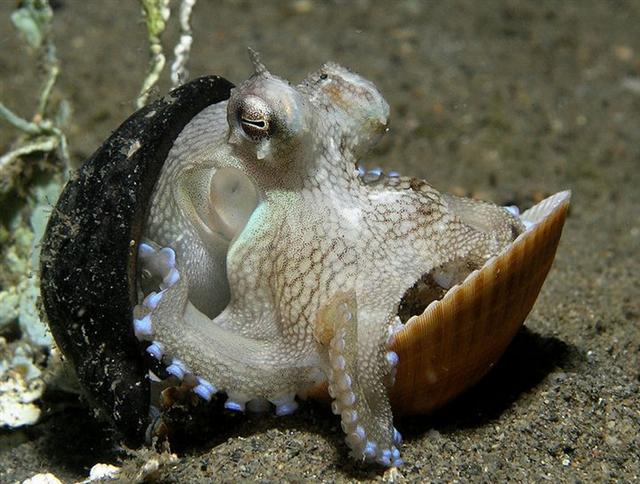
Mamari. Egg, fish
roe. mâmari ata rauhau, last small
egg laid by a hen before she turns broody.
Vanaga. Egg (of fowl or fish), (gamamari),
(Cf. komari.); mamari punua,
chicken in the shell. Churchill.
Kiakia. Dove,
gull T. Mgv.: kiakia, the cry of the
kotake (a white marine bird.)
Churchill.
Kumara. Sweet potato.
The main varieties are: kumara pita,
kumara rega moe tahi uriuri, kumara rega
moe-tahi teatea, kumara rega vî'e, kumara
aro piro,
kumara paka taero, kumara
ariga rikiriki,
kumara uriuri, kumara ûka teatea, kumara ure
omo, kumara ha'u pú, kumara ure omo uriuri.
Vanaga. Sweet potato. P Pau., Mgv.:
kumara, id. Mq.: kumaá, id. Ta.:
umara, umaa, id. Churchill.
Koro. 1. Father
(seems to be an older word than matu'a
tamâroa). 2. Feast, festival; this is
the generic term for feasts featuring songs
and banquetting; koro hakaopo, feast
where men and women danced. 3. When (also:
ana koro); ana koro oho au ki
Anakena, when I go to Anakena; in
case, koro haga e îa, in case
he wants it. Vanaga. If. Korokoro, To
clack the tongue (kurukuru).
Churchill. Ma.: aokoro, pukoro,
a halo around the moon. Vi.: virikoro,
a circle around the moon. There is a
complete accord from Efaté through Viti to
Polynesia in the main use of this stem and
in the particular use which is set to itself
apart. In Efaté koro answers equally
well for fence and for halo. In the marked
advance which characterizes social life in
Viti and among the Maori the need has been
felt of qualifying koro in some
distinctive manner when its reference is
celestial. In Viti virimbai has the
meaning of putting up a fence (mbai
fence); viri does not appear
independently in this use, but it is
undoubtedly homogenetic with Samoan vili,
which has a basic meaning of going around;
virikoro then signifies the
ring-fence-that-goes-around, sc. the moon.
In the Maori, aokoro is the
cloud-fence. Churchill 2. |
|




















